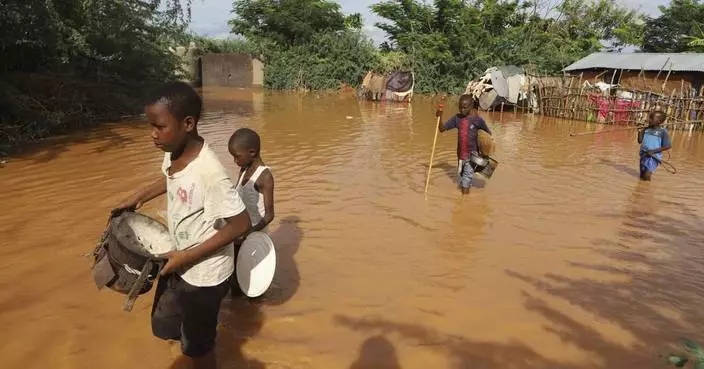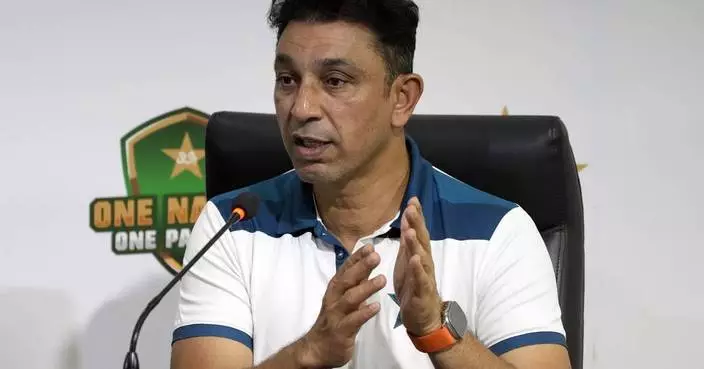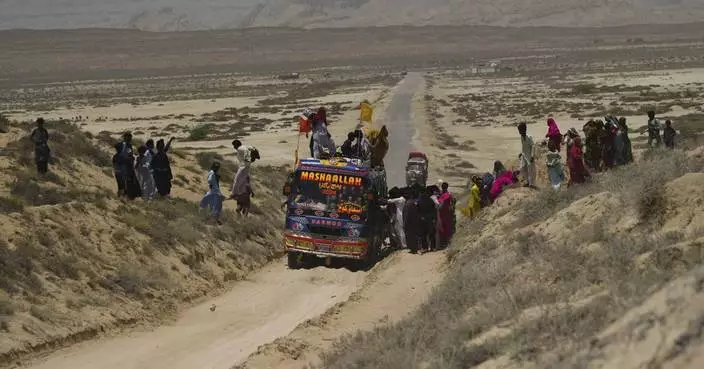Pakistani officials say the melting of a glacier has unleashed landslides and floods in the country's northern district of Ghizer, inundating dozens of homes and displacing hundreds of people.
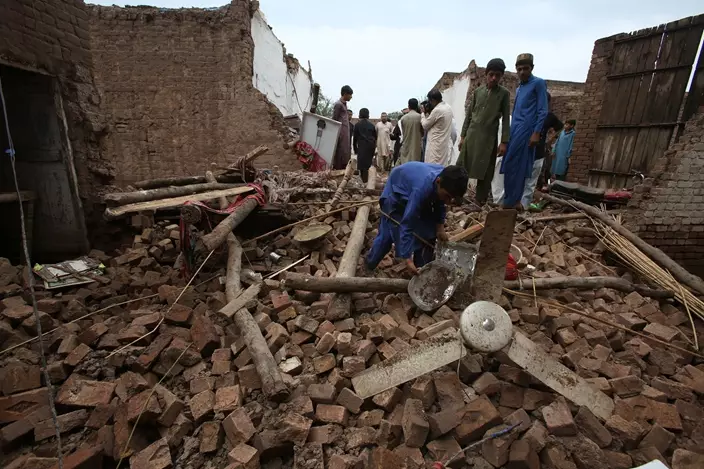
Pakistani villagers salvage belongings from their collapsed houses in Peshawar, Pakistan, Friday, July 20, 2018. Heavy rain resulted in roof collapsing and has killed a father and daughter while injuring son, police said. (AP Photo/Muhammad Sajjad)
Mohammad Khalid, a local police official, said Friday that authorities are sending relief supplies to the flood-hit villages.
The region's disaster management authority said authorities are evacuating people from Ghizer, where a key road has been flooded. Residents say dozens of people have taken refuge further up mountains and were waiting for help.
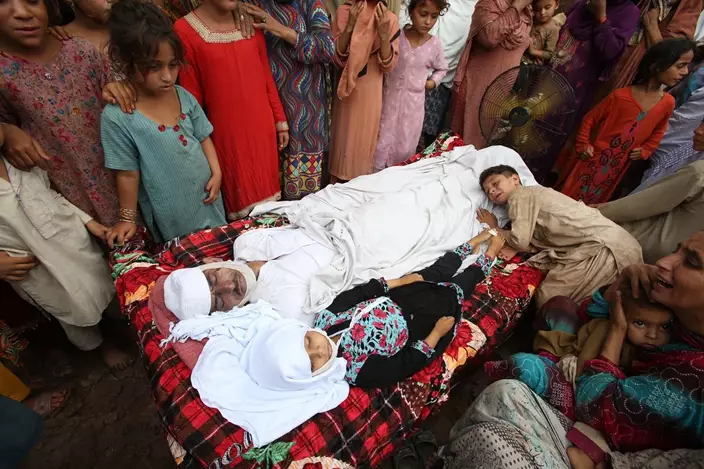
People mourn the deaths of their family members in Peshawar, Pakistan, Friday, July 20, 2018. Heavy rain resulted in roof collapsing and has killed a father and daughter while injuring son, police said. (AP Photo/Muhammad Sajjad)
Also Friday, two people were killed in the northwestern city of Peshawar after a roof caved in, and rains also lashed the eastern city of Lahore.
Landslides and flash floods are common across Pakistan during the monsoon season.
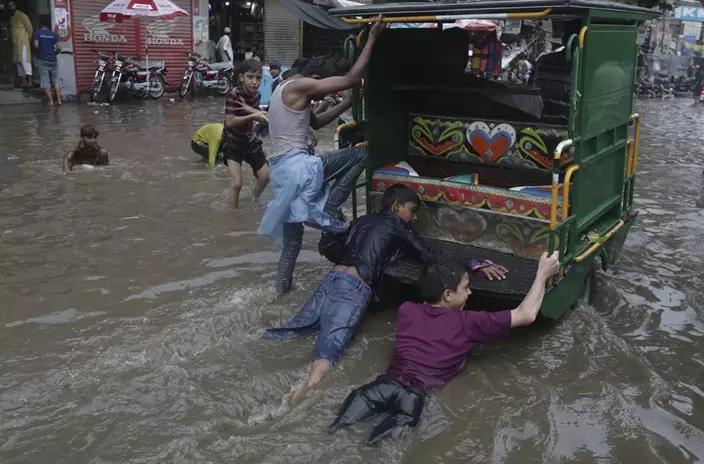
Pakistani children play in a flooded street following heavy rain in Lahore, Pakistan, Friday, July 20, 2018. Flash floods are common across Pakistan during the monsoon rains, which killed two people in the northwestern city of Peshawar after a roof caved in there. official said. (AP Photo/K.M. Chaudary)
WASHINGTON, D.C. (AP) — A fugitive task force attempting to serve a warrant Monday in Charlotte, North Carolina, ended in the deadliest day for U.S. law enforcement in a single incident since 2016.
Four officers were killed and four more were wounded after the suspect began firing from an upstairs window, starting a shootout with task force officers. More officers responded as backup and were also struck by gunfire, authorities said.
At least three officers on the initial task force were killed — a deputy U.S. Marshal and two officers with the North Carolina Department of Adult Correction — as well as an officer with the Charlotte-Mecklenburg Police Department.
The task force is one of dozens led by the US Marshals that find fugitives and serve hundreds of warrants every day around the U.S. Here's a look at how they operate and how they take on the task of finding and arresting some of the most dangerous suspects:
Federal law enforcement agencies often work with local police around the country on task forces, which are typically teams of law enforcement officers from different agencies working together on investigations in a specific area such as drugs, terrorism or gangs.
The U.S. Marshals Service is the primary federal agency tasked with tracking down fugitives, and their task forces are typically focused on finding people wanted on criminal warrants. They also often take the lead when searching for a known suspect in a high-profile crime or finding escaped prisoners.
There are nearly 4,000 deputy U.S. Marshals, and they work with more than 3,500 officers from departments around the country on dozens of fugitive task forces including local and regional efforts. It's a setup that can benefit both sides: local police bring manpower and deep knowledge of an area, while federal law enforcement has access to additional resources. Working with federal law enforcement can also bring expanded authority and more serious federal charges to the table.
An assignment to a federal task force is often a full-time job that requires rigorous training and qualifications, said Mark Lomax, a consultant and former executive director of the National Tactical Officers Association.
When Lomax served as a major in the Pennsylvania State Police, he had several troopers assigned to federal task forces, including with the U.S. Marshals.
“They are very, very professional. This is what they do. When you are going after bad guys, really, really bad characters that’s who you want there, the marshals,” Lomax said. “They are trained to do it. They are equipped to do it. They have the mentality. They are the best of the best. And that includes the task force members. They pick individuals who meet their requirements, and they go through a lot of training and are matched with personnel.”
Officers are usually assigned to federal task forces for at least a couple years, though the duration varies by location and agency, said Anthony Cangelosi, a lecturer at John Jay College of Criminal Justice and former deputy U.S. Marshal in New York City.
U.S. Marshal task forces are usually looking for people who have been charged with a crime, but are out on the run or have failed to appear in court.
Investigators are looking for last known addresses, their friends and family, credit card usage — anything that might point to where they are, Cangelosi said.
“You're just trying to find anything that could locate that individual,” he said.
Operations like the warrant being served in Charlotte don't happen without planning, Lomax said. Reconnaissance and surveillance is a large part of the work. When task force members are sure they have found a viable location for a fugitive, there’s sometimes even practice drills.
“They are working informants. They are doing their due diligence, talking to family members, friends, and nowadays there’s a lot of technology involved,” he said. “Once they have identified where the individual may be, they will surveil and do intel and have sufficient personnel and equipment to be able to address that situation.”
Lomax said that may involve watching a house to see if there are children or dogs or other factors that need to be considered, especially when there’s a weapon involved.
“They may even go to a parking lot or other area and practice how they plan to enter or approach, figure out the best approaches,” he said. “They do a lot of homework. But no matter how much planning and preparation you do, you don’t know what the person on the other side of that door is going to do. Even if you know they could be armed and you prepare, you can’t prepare for everything.”
Lauer reported from Philadelphia.
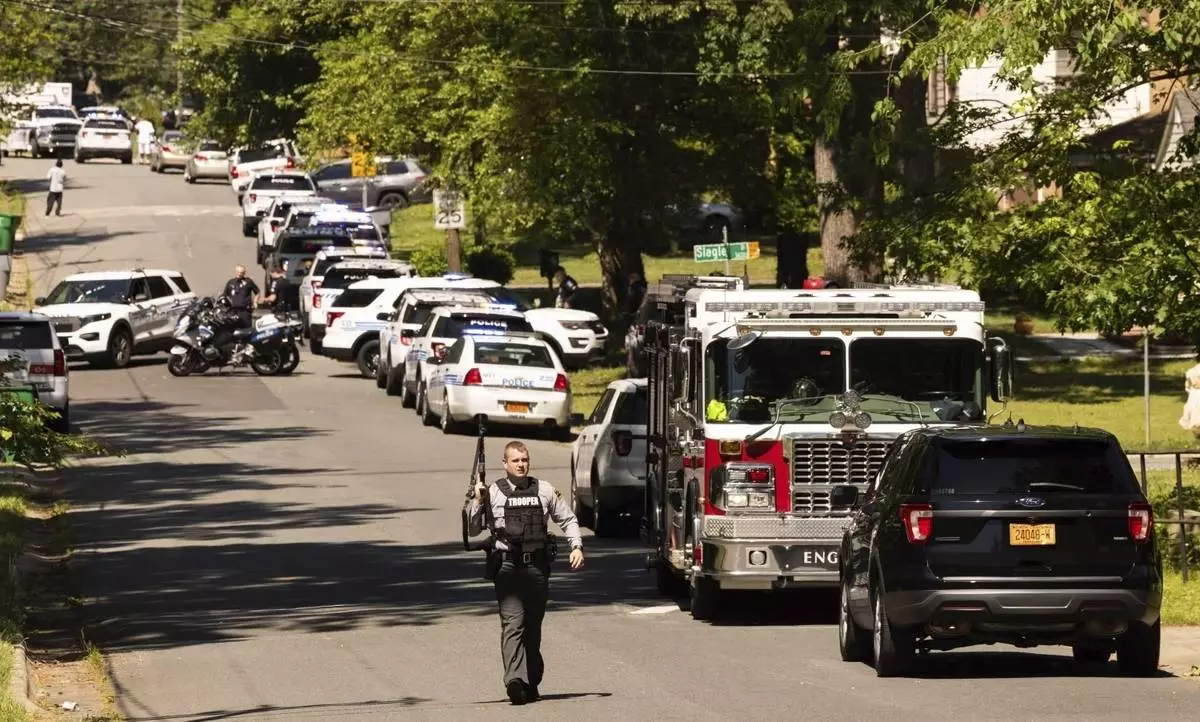
Multiple law enforcement vehicles respond in the neighborhood where several officers on a task force trying to serve a warrant were shot in Charlotte, N.C., Monday, April 29, 2024. (Melissa Melvin-Rodriguez/The Charlotte Observer via AP)
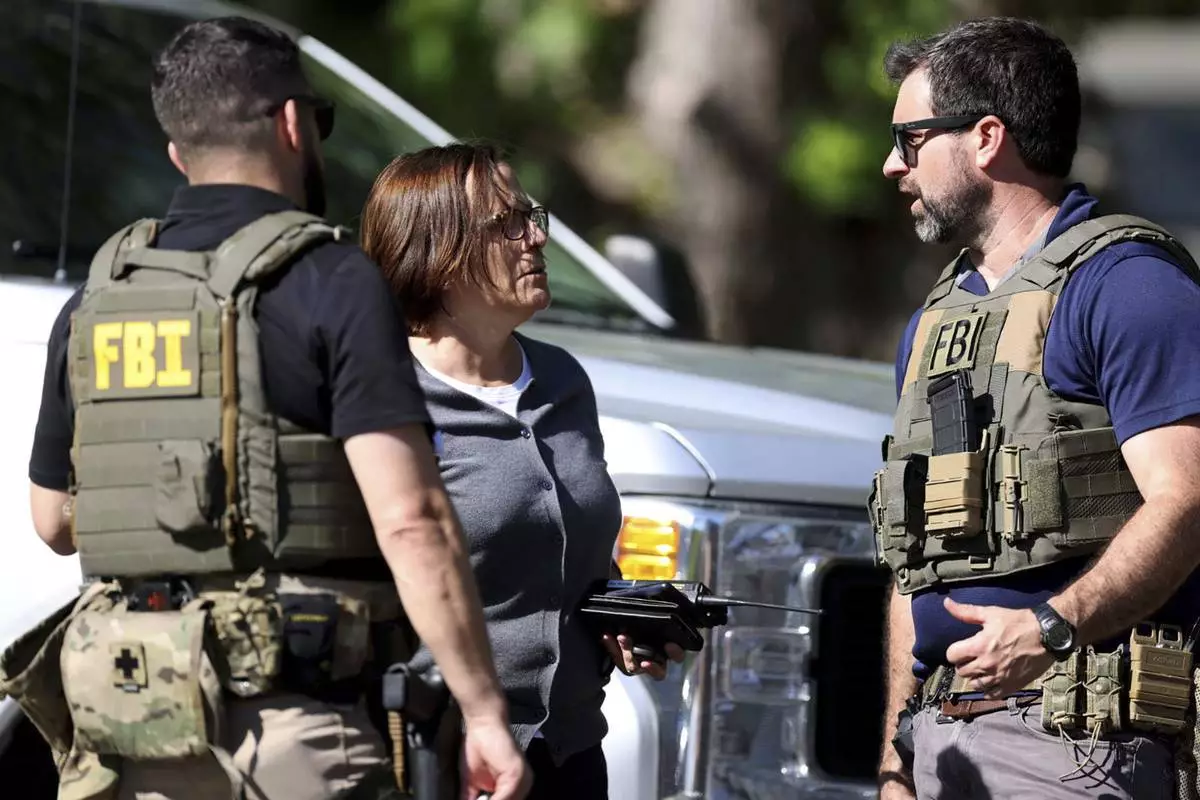
Members of FBI talk with each other at the scene of a shooting on Galway Drive in Charlotte, N.C., on Monday, April 29, 2024, Multiple law enforcement officers were shot while serving a warrant for a felon wanted for possessing a firearm. (Khadejeh Nikouyeh/The Charlotte Observer via AP)
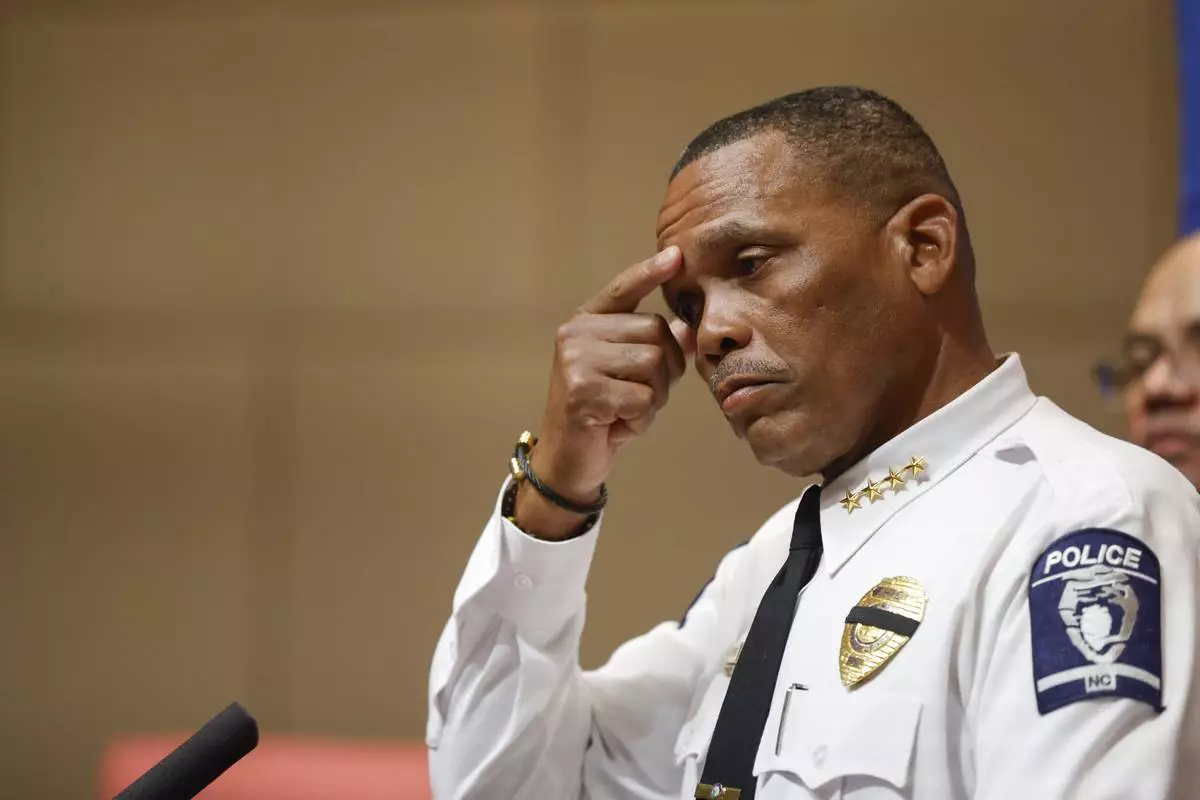
Charlotte-Mecklenburg Police Chief Johnny Jennings pauses to compose himself during a press conference in Charlotte, N.C., Tuesday, April 30, 2024, regarding a shooting that killed four officers during an attempt to serve a warrant on April 29. (AP Photo/Nell Redmond)
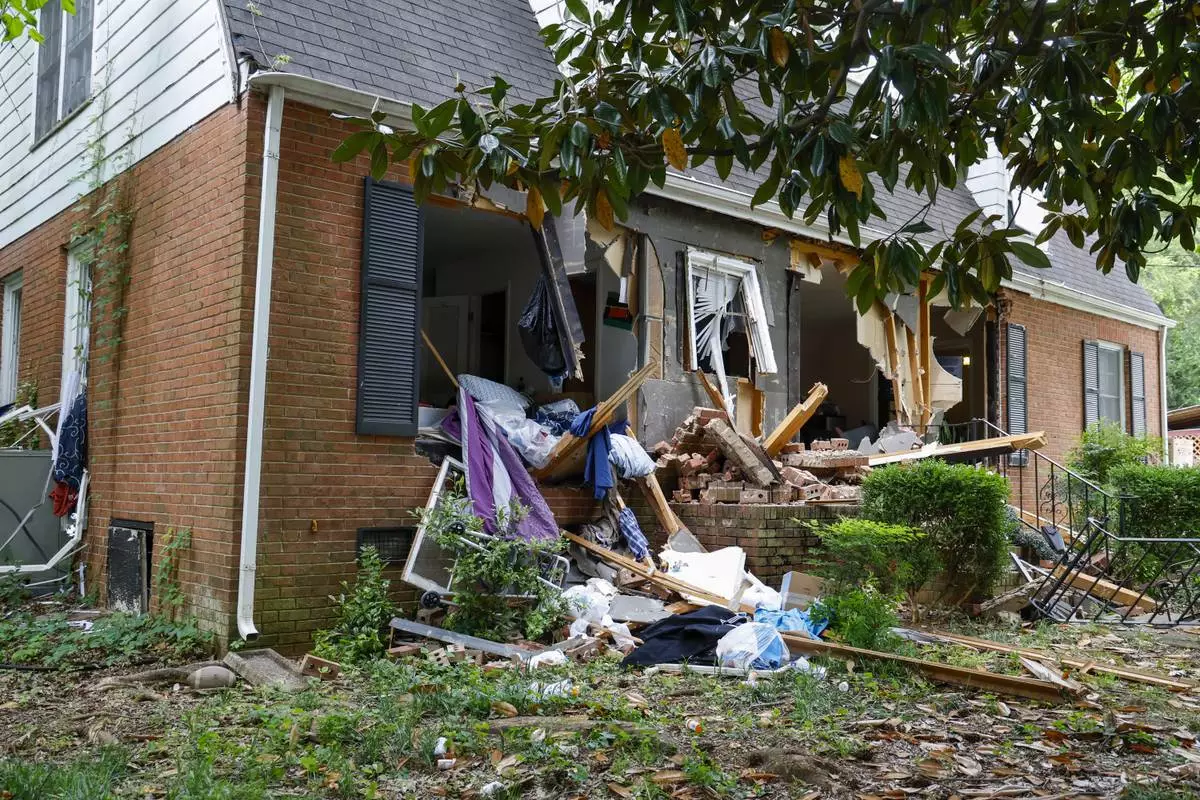
Debris surrounds a home, Tuesday, April 30, 2024, where a shootout between a suspect and officers occurred on Monday, in Charlotte, N.C. Police say a shootout that killed four law enforcement officers and wounded four others began as officers approached the home to serve a warrant for a felon wanted for possessing a firearm. (AP Photo/Nell Redmond)
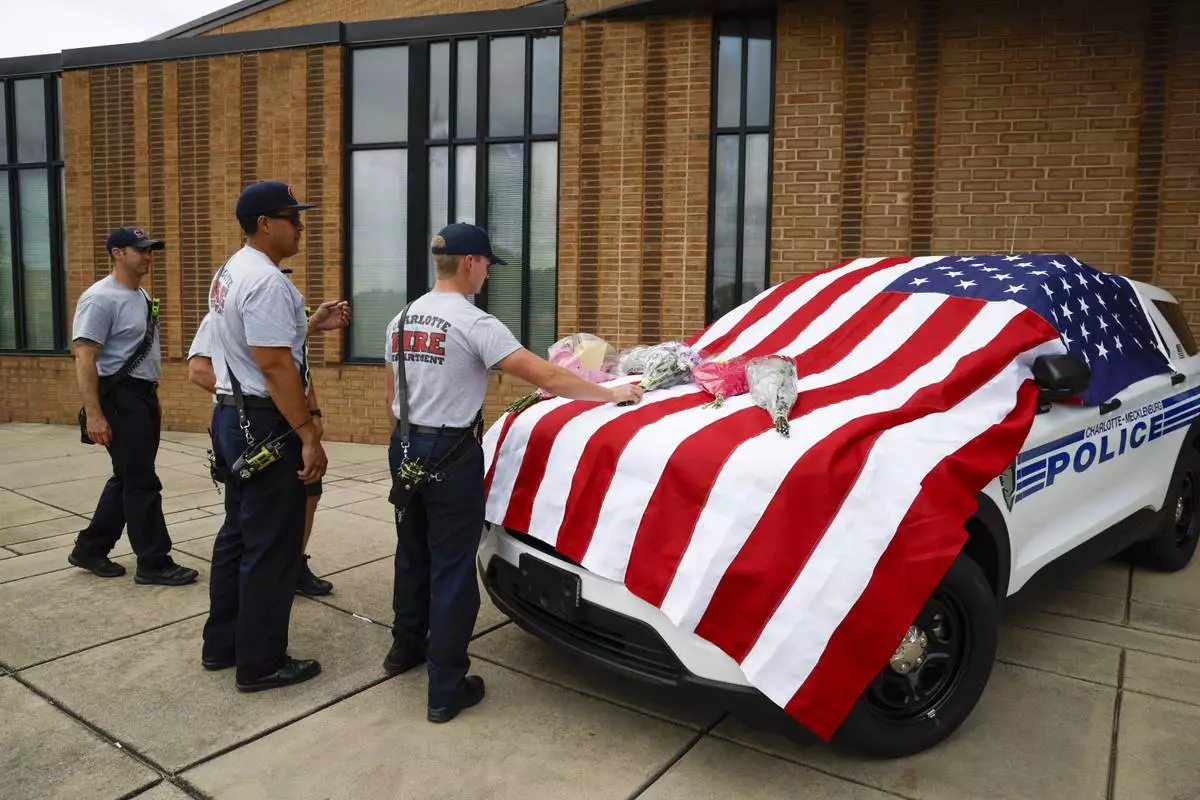
Charlotte firefighters from Engine 7 bring flowers to a flag-covered Charlotte-Mecklenburg police vehicle at the North Tryon Station in Charlotte, N.C., Tuesday, April 30, 2024, where Charlotte-Mecklenburg Officer Joshua Eyer was stationed. Police in North Carolina say a shootout that killed several law enforcement officers, including Eyer, and wounded others began as officers approached a home on Monday to serve a warrant for a felon wanted for possessing a firearm. (AP Photo/Nell Redmond)

This combo of undated images provided by law enforcement, shows, from left, Sam Poloche and William Elliott of the North Carolina Department of Adult Corrections; Charlotte-Mecklenburg Officer Joshua Eyer; and Deputy U.S. Marshal Thomas Weeks. The four officers were killed and four others were wounded, Monday, April 29, 2024, in suburban Charlotte, as they approached a home to serve a warrant for a felon wanted for possessing a firearm. (North Carolina Department of Corrections (2), Charlotte-Mecklenburg Police Department, US Marshals Service via AP)












